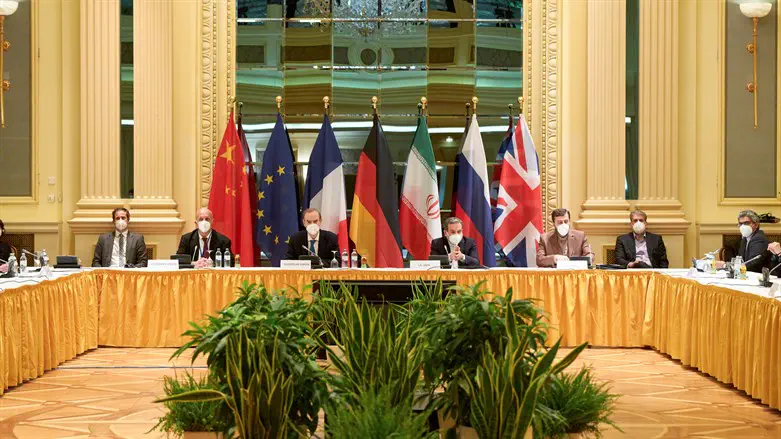
Senior policy figures advising the Israeli government have assessed that if war breaks out between Russia and Ukraine, it could motivate the United States to sign a nuclear agreement with Iran that contains less safeguards and will potentially pave the way to the Islamic regime gaining a nuclear weapon faster.
According to a report published in Israel Hayom, if a military confrontation develops in eastern Europe, it will distract the already waning attention of western powers to the nuclear talks still ongoing in Vienna. With the United States seemingly incapable of dealing with two international crises simultaneously, so goes the assessment, Russia’s invasion of Ukraine will prompt the United States to make more and more concessions to the Iranians.
Many both in Israel and the United States are feeling a growing sense of frustration at the weak stand being made by the Biden administration in face of Iranian intransigence. Last week, 33 senators from the Republican party published a joint condemnation of the concessions they see being made in Vienna. They clarified that if Biden does not seek Congressional approval for any agreement his team reaches, they will use all the means at their disposal to force him to do so.
The joint declaration was the initiative of Senator Ted Cruz, who stressed that one of his key demands is that sanctions against Iran not be removed. “The Trump administration imposed hundreds of types of sanctions, tests, laws, and processes against Iran,” he noted. “These steps were taken after we left the nuclear deal in 2018, and were not directly related to that fact.”
Interpreting Cruz’s words, a senior official said that they were intended to signal to the Iranians that even if the Biden nuclear team does sign an agreement that is seen as favorable to Iran, they should not presume to rest on their laurels, as a future Republican administration would not hesitate to withdraw from that agreement.
In fact, criticism of the Biden team’s handling of the issue is being heard from the Democratic party as well, with several senators decrying what they see as a conciliatory approach. Senator Robert Menendez in particular has been outspoken against the approach, drawing attention to the promises of senior administration officials that they would reach a “stronger, more long-lasting” agreement, and claiming that the opposite is occurring.
“We cannot ignore the support being given to terrorist entities by Iran, or the issuing of threats against American lives and American interests,” he said. “While we should welcome the legitimate and peaceful uses that can be attained by way of nuclear power, we must also remain true to our principle of non-proliferation and to our unwavering desire to build a more stable, secure, and prosperous world for the American people and indeed for all peace-loving people. To achieve this, Iran must not be permitted to possess nuclear weapons. Many of the concerns I expressed about the JCPOA in August 2015 are returning to haunt us in 2022,” Menendez warned.
